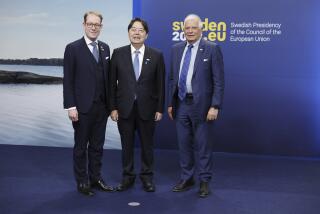Soviets Attempt to Allay Japan’s Military Fears : Diplomacy: The two nations condemn Iraq’s seizure of Kuwait. They also agree to broaden their now-strained relationship.
- Share via
TOKYO — The Soviet Union and Japan on Wednesday issued their first joint communique on an international issue in half a century and agreed to regular consultations on political and military affairs.
The two steps promised to broaden what officials of both nations have recognized as a narrow and strained relationship.
Soviet Foreign Minister Eduard A. Shevardnadze proposed, also for the first time, taking certain confidence-building measures to allay Japanese fear of Soviet military power.
He stopped short, however, of acceding to Foreign Minister Taro Nakayama’s demand that the Soviet Union unilaterally reduce its forces in Asia, including about 20,000 troops stationed on Etorofu, one of four islands the Soviets seized from Japan after World War II.
The unexpected joint communique from the two foreign ministers, issued after 5 1/2 hours of discussion, also condemned Iraq’s occupation of Kuwait. It supported “making collective efforts and fully utilizing the various organs of the United Nations” to persuade Baghdad to free foreign hostages, withdraw from Kuwait and restore the Kuwaiti rulers.
Although the communique broke no new ground in either nation’s Middle East policy, it was the two countries’ first joint statement on any non-bilateral issue since they were parties to a World War II nonaggression pact that the Soviets broke six days before the war ended in 1945. It was also the first joint declaration that Japan has taken outside the framework of its self-declared status as “a member of the Western camp.”
The agreement to start regular consultations on security and foreign policy issues of a political nature was described by a Japanese diplomat as “unthinkable in previous Japan-Soviet relations.” A year ago, Japan rejected a Shevardnadze proposal concerning such talks.
Seeking to lay the groundwork for Soviet President Mikhail S. Gorbachev’s first trip to Japan, planned for next spring, Shevardnadze tried to convince Nakayama that the Soviet Union “is making efforts to reduce its military activity in the Asia-Pacific region,” according to a Japanese diplomat who requested anonymity.
The diplomat quoted Shevardnadze as telling Nakayama: “Now that the United States and the Soviet Union no longer view each other as enemies, the time has come for Japan to rethink its policy of viewing the Soviet Union as a threat.”
The Soviet foreign minister suggested eight specific confidence-building steps, including exchanges between Japan’s Defense Agency and the Soviet Defense Ministry, mutual visiting of ships and military personnel and mutual observations of military exercises.
Shevardnadze criticized a Japanese military buildup that he said was continuing even though Japan has pledged not to become a military power. Many Asian nations, he said, are concerned about Japan’s “military plans.”
Nakayama countered that Japan’s so-called “peace constitution” forbids sending troops overseas, and he recited Japanese policies that restrain military expansion. The U.S.-Japan Security Treaty, he added, “gives credibility to these policies.”
He called for a reduction of Soviet forces in Asia, which, he said, dwarf Japanese military power.
Despite Nakayama’s statement about Japan’s ban on dispatching troops, Chief Cabinet Secretary Misoji Sakamoto announced earlier in the day that the government will consider reinterpreting the law to determine whether its forces can participate in international peacekeeping missions such as the U.S.-led multinational force in the Middle East.
Only a week ago, Prime Minister Toshiki Kaifu had said Japan would send only civilian personnel to offer nonmilitary support in the gulf crisis. Since then, however, several leaders of the ruling Liberal Democratic Party have urged the government to reconsider established constitutional interpretations before revising laws that prohibit dispatch even of civilians to areas involved in a military conflict.
The calls for a new constitutional interpretation came after U.S. Ambassador Michael Armacost said that Japan should share the risk, not just the cost, of the Middle East peacekeeping effort.
More to Read
Sign up for Essential California
The most important California stories and recommendations in your inbox every morning.
You may occasionally receive promotional content from the Los Angeles Times.













